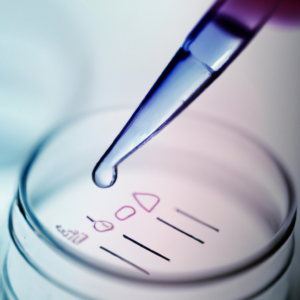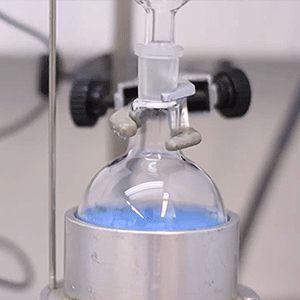Our research goals
Working for a new generation of diagnostic and therapeutic tools
Developing bioreceptors with tailored properties
The specific signal coming from our diagnostic tools is provided by tailored, specific bioreceptors. These biomolecules are crucial to develop the most appropriate diagnostic techniques. We have achieved a broad set of monoclonal and polyclonal antibodies, haptens and bioconjugates thanks to a strong background in organic chemistry assisted by molecular modelling tools and screening procedures. Our long-standing expertise on antibody production against small, non-immunogenic molecules makes us different from the rest.
Creating new functional (bio)hybrid materials
The preparation of biosensors for detection and diagnostic purposes requires immobilising the active biomolecules onto solid supports. To construct robust and reliable biosensors it is essential to have functional biomaterials meeting specific requirements of biocompatibility, homogeneity, stability and specificity. Such functional materials are prepared in our group through diverse chemical and technological approaches.
Investigating into more efficient IVD tools
Current in vitro diagnostic (IVD) tools have limitations of specificity, detection or cost-effectiveness. By exploiting immunochemical techniques, we aim to develop a new generation of IVD tools resulting in outstanding outcomes (for example, lower LODs, shorter analysis times, and improved specificity). In addition, obtaining point-of-care (PoC) devices, which are key for the diagnostics laboratory de-centralisation, is another major goal for us.
Exploring the therapeutic potential of antibodies
Given our strong know-how on antibodies against a broad pool of clinical targets, we have decided to explore their potential use for therapy of certain pathologies. We aim to reduce or replace the use of antibiotics, which are partly responsible for the enormous global threat of antimicrobial resistance (AMR).
From the clinical field to food safety and environmental monitoring
Our goals are related to different research areas

Bacterial infectious diseases
We work on specific, reliable and early diagnostics that prevent thousands of deaths and improve the well-being of patients. In addition, we explore the potential of antibodies as therapeutic tools that can combine with, and even replace, antibiotic treatment.
Related projects
Past related projects

Other diseases and translational research
Neurodegenerative disorders and cardiovascular diseases have been, among others, traditionally in the focus of our research, advancing for specific diagnostic tools for both types of health concerns. Moreover, we support translational research in close collaboration to clinical partners, in regard with further diseases such as mitochondrial or the dry-eye disease.
Related projects
Past related projects

Chemical exposure assessment
There are many chemical compounds surrounding us, in the environment, that pose real risk to human health. We care about how toxicological compounds and other health-threatening factors can affect our organism and interact with it.
Related projects

Food safety and environmental monitoring
Our differential ability to produce specific antibodies to small molecules has enabled developing immunoreagents and diagnostic tools to detect and quantify some pollutants present in food, water, soil and air.
Past related projects
FoodSmartphone, SEA-ON-A-CHIP

Further applications
We keep open to participate in other projects in which our background and know-how on antibodies, immunochemistry and biomaterials may be profitable and result in positive outcomes for the society and the scientific progress.




